KANSAS CITY — More than ever, baking executives insist that the pathway to renewed growth in the sliced bread category will be lined with innovative new products successfully tapping into changing consumer preferences.
New product introductions in bread are stepping up, at least moderately. Discussions with executives at several national and regional baking companies pointed to an increased focus on innovation and stepped-up marketing efforts. Among numerous consumer trends targeted in the new products, pursuit of clean label — formulations free from ingredients perceived as iffy by the public — has become the most prominent new product theme in the bread category. New product introductions also targeted the breakfast, premium and organic segments of the bread market.
In the 52 weeks ended Feb. 2, bread sales were $9,119,242,806, up a small fraction of 1% from the same period the year before, according to data issued by Information Resources, Inc., Chicago. Unit sales were 3,813,246,181, down 1%. The modest aggregate changes masked more noteworthy shifts at the individual company level. While the largest bakers experienced unit sales gains during the year, most other bakers experienced declines, significant in some cases. Private label’s share of the sliced bread market continued to erode.
The bread lineup at Flowers Foods, Inc., Thomasville, Ga., has changed significantly over the last several years, with the acquisition of Wonder, Dave’s Killer Bread and other brands. D.K.B. has been a growth engine at Flowers since the organic bread baker was acquired by Flowers in 2015. In 2017, the line expanded into the brea kfast category with a single bread variety (Raisin’ the Roof!) and three bagel varieties (Plain Awesome, Epic Everything and Cinnamon Raisin Remix). Like the remainder of the D.K.B. line, the breakfast items are organic, non-G.M.O. and “power packed with nutrition,” Flowers said.
kfast category with a single bread variety (Raisin’ the Roof!) and three bagel varieties (Plain Awesome, Epic Everything and Cinnamon Raisin Remix). Like the remainder of the D.K.B. line, the breakfast items are organic, non-G.M.O. and “power packed with nutrition,” Flowers said.
Later this month, another bagel variety (Boomin’ Berry) will be introduced.
Dan Letchinger, senior vice-president, Fresh Packaged Bread Business Unit, described the new product as “our take on a berry bagel” but with “power-packed organic nutrition.”
D.K.B. is one of four core brands that Flowers has said will be the focus of attention in coming years as the company seeks to accelerate growth. The other brands are Nature’s Own, Wonder and Tastykake. Initiatives to boost the bread brands have been centered on bagels and buns rather than bread.
An exception is Flowers’ decision to introduce a new bread line in late April under its Nature’s Own banner. Dubbed Perfectly Crafted, Flowers said the new product line is distinctly different from the rest of the Nature’s Own lineup and is an artisan-inspired, thick-sliced bread that is Non-GMO Project Verified and presents a clear point of difference from other offerings in the fresh packaged bread aisle.
“We’re excited about the quality, taste, and texture of this new line and are offering two varieties — white and multigrain,” said Brent Bradshaw, senior vice-president, Fresh Packaged Breads.
Perfectly Crafted, like other Nature’s Own bread, will contain no artificial preservatives, colors, or flavors or high-fructose corn syrup. The company said the line will be available throughout the Flowers direct-store delivery territory and will be supported with national marketing and a strong in-store sampling program.
In the case of Wonder, Flowers is looking to give the brand a boost by kicking off the 2018 grilling season with a “Camo for the Cause” campaign. Beginning April 23, Wonder Classic hamburger and hot dog buns will feature c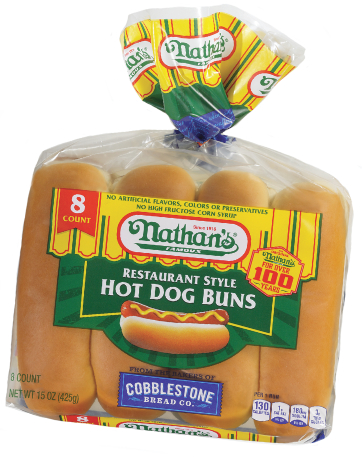 amouflaged packaging in support of the U.S. military.
amouflaged packaging in support of the U.S. military.
Similarly, Flowers’ Cobblestone Bread Co. super premium line has eyed buns as a growth opportunity. The company has partnered with Nathan’s Famous to launch restaurant-style hot dog buns with no artificial flavors, colors, or preservatives and no high-fructose corn syrup. The premium hot dog bun will be introduced in late April.
“Consumers want variety and are continuing to migrate toward ‘better for you’ products that taste great,” said Bradley K. Alexander, president of the Flowers Fresh Packaged Bread Business Unit. “Companies that innovate will be successful in the future and will drive growth.”
Pepperidge updates Farmhouse
While Campbell Soup Co. in recent days has said increasing emphasis will be placed on its snacking business, the company is not neglecting its fresh bread heritage. On April 6, Norwalk, Conn.-based Pepperidge Farm announced the launch of a new formulation and packaging for the top stock-keeping-unit of its Farmhouse bread line — Farmhouse Hearty White. Additionally, in the Northeast, Pepperidge ls launching Farmhouse Butter Bread.
A campaign conducted by the company in connection with the product update and introduction will be launched with a tagline of “Perfection now in softer thick slices.”
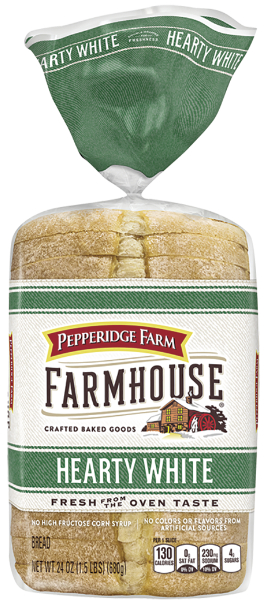 Even though the company’s Goldfish crackers and cookie lines have been principal growth drivers at Pepperidge for many years, the company still touts its origins in bread, citing the company’s founder Margaret Rudkin’s relentless focus on quality.
Even though the company’s Goldfish crackers and cookie lines have been principal growth drivers at Pepperidge for many years, the company still touts its origins in bread, citing the company’s founder Margaret Rudkin’s relentless focus on quality.
Pepperidge said the new products will feature fresh-from-the-oven, new and improved taste; thick slices; no added colors; no artificial colors or flavors; and no high-fructose corn syrup.
According to Pepperidge Farm, its products may be found in about 75% of households nationally. The company’s 58 varieties of bread, buns and rolls all are HFCS-free and contain no flavors or colors from artificial sources. The company describes its Farmhouse line as “slow baked … with deliberate, thoughtful care.” Other Farmhouse varieties include honey wheat, oatmeal, potato, sourdough and whole grain white.
Its other bread lines include Harvest Classics, Italian bread, Party bread and light style bread, together with white and variety bread and whole grain bread.
The Pepperidge business, established in 1937 by Ms. Rudkin, has been owned by Campbell Soup since 1961. Pepperidge estimates it bakes 17 million loaves of bread each week and is a major reason Campbell Soup produces 4 billion servings of whole grains annually.
Aunt Millie’s says no to G.M.O.s
At Aunt Millie’s Bakeries, Fort Wayne, Ind., clean label stands out as a clear and present opportunity, said M. Melissa Dunning, senior director of marketing.
“The main trend that we are seeing is clean label,” she said. “Consumers care more and more about that. And the word natural has become problematic because of possible Food and Drug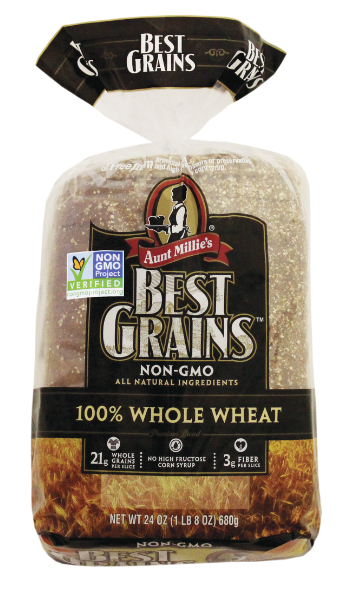 Administration rulings and because people don’t really know what that means. ‘Free from’ and ‘clean label’ seem to be more specific and appealing to consumers now.”
Administration rulings and because people don’t really know what that means. ‘Free from’ and ‘clean label’ seem to be more specific and appealing to consumers now.”
Currently, Aunt Millie’s is looking to expand its line of baked foods with Non-GMO Project certification.
“We came out with a super premium line of bread under the Best Grains brand in 2015,” Ms. Dunning said. “In 2016 we went through Non-GMO certification for the line. We went through a rigorous process to achieve that.”
Rather than dubbing the line “natural,” Aunt Millie’s promotes the certification and pledges, “We add nothing artificial.”
The company says, “Aunt Millie’s Best Grains breads are free of artificial ingredients and G.M.O.s. These ‘clean label’ breads are flavored with the finest ingredients like molasses, malt and sea salt and they taste great!”
The line features 11 varieties, including 4 that are organic (Seedful, 100% whole wheat, honey 9 grain, and native grains) bread.
The Best Grains line emanated from an earlier premium brand at Aunt Millie’s.
“We formerly had Aunt Millie’s hearth bread,” Ms. Dunning said. “It’s a pan loaf bread, merchandised standing up. It was converted to Aunt Millie’s Best Grains in 2015. They’ve done well, and we’ve been able to hone the line.”
 Aunt Millie’s core markets are the states of Indiana, Michigan, Ohio and Illinois. The company is expanding into Kentucky and Wisconsin.
Aunt Millie’s core markets are the states of Indiana, Michigan, Ohio and Illinois. The company is expanding into Kentucky and Wisconsin.
Also in its clean label efforts, Aunt Millie’s has been removing high fructose corn syrup from its baked products.
“We have a little blue flag on the package when there is no HFCS,” he said. “It’s among the top tier of attributes consumers are looking for. Not all consumers, but even if a consumer isn’t looking for it, they tend to look favorably on a product that is flagged.”
Beyond Best Grains, the company sells bread under the Healthy Goodness, Homestyle, Sunbeam, Hillbilly, Perfection, Milano and Koepplinger’s brands in addition to Aunt Millie’s Swirl bread.
Noting the challenges many baking companies, including Aunt Millie’s, are experiencing in pursuit of growth in the bread category, Ms. Dunning said success moving forward will depend on introducing more new products that appeal to consumers with changing interests.
“Innovation is critical,” she said. “I read an article about Nestle talking about themselves as a 150-year old start-up company. They strongly feel they need to innovate for the future. The same is true in the bread business. Our industry has seen its challenges. Challenges of changing habits, of a younger generation that shops differently, of people shopping online, of the smaller family size. And on top of that, there are the anti-gluten and anti-carb trends.”
Challenge of millennials
Similar concerns about changing consumption habits were expressed by Howard R. (Robin) Alton III, president and chief executive officer of Pan-O-Gold Baking Co., St. Cloud, Minn.
“Seniors buy two loaves a week. Baby boomers buy one loaf. Millennials call Jimmy Johns."
— Robin Alton III, Pan-O-Gold Baking Co.
“I don’t think millennials are buying bread at the same rate as the predecessor generations,” he said. “We say our best customers are dying — seniors buy two loaves a week. Baby boomers buy one loaf. Millennials call Jimmy Johns. Trying to get them interested is a struggle. They are delaying having families — maybe then it will get better.”
Sluggish demand compounds challenges in the operating environment for baking companies, Mr. Alton said.
“Business is fair,” he said. “It’s difficult to pass along increased input costs. Companies haven’t raised prices much, and we are paying more and more in health care, labor and rent. We have to pay more to attract employees. Ingredient costs are up, and fuel is up substantially. I like to say we’re a big trucking company that happens to haul bread.”
Pan-O-Gold has eyed the breakfast market as its best opportunity for innovation. The company has expanded its breakfast line with seasonal items.
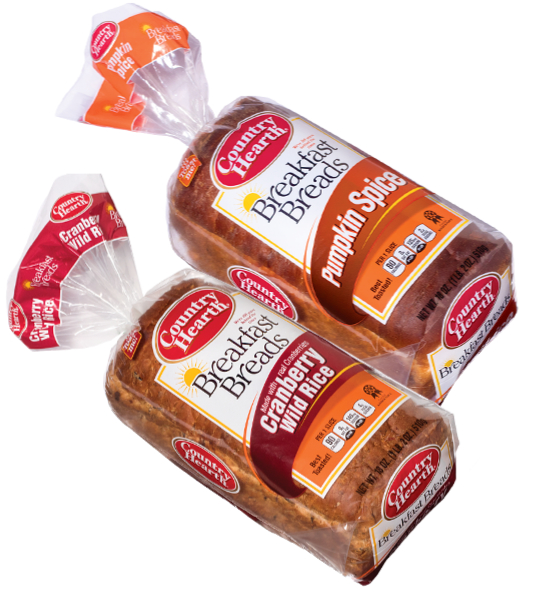 “We added a pumpkin spice, which sold pretty well in the fall,” he said. “It’s similar to Starbucks and their pumpkin latte. Blueberry did pretty well, also seasonally.”
“We added a pumpkin spice, which sold pretty well in the fall,” he said. “It’s similar to Starbucks and their pumpkin latte. Blueberry did pretty well, also seasonally.”
Other varieties introduced include apple cinnamon and cranberry wild rice.
“Cranberry wild rice also is a breakfast bread,” Mr. Alton said. “Wild rice is indigenous to the Minnesota area, and people are more familiar with it. Cranberries grow in Wisconsin. It’s a bread that might not sell as well in the South. It has generated good demand.”
All of the breakfast bread lines are sold under Pan-O-Gold’s flagship Country Hearth brand. Year-around products under the line include cinnamon raisin, cinnamon burst and muffin bread.
“We have seen big growth in breakfast bread across all baking companies,” Mr. Alton said.
Adding to challenges facing Pan-O-Gold is weakness in demand for private label, a significant part of the company’s business.
“We have seen growth in premium bread almost commensurate with the decline of private label,” Mr. Alton said. “That’s a good thing. A premium loaf bread, as the economy is doing well, is seen as an affordable luxury. Even during the down economy, when you would think private label would do well, it didn’t. I think people are looking for more nutritious product, and they believe they get it with a more premium product.”
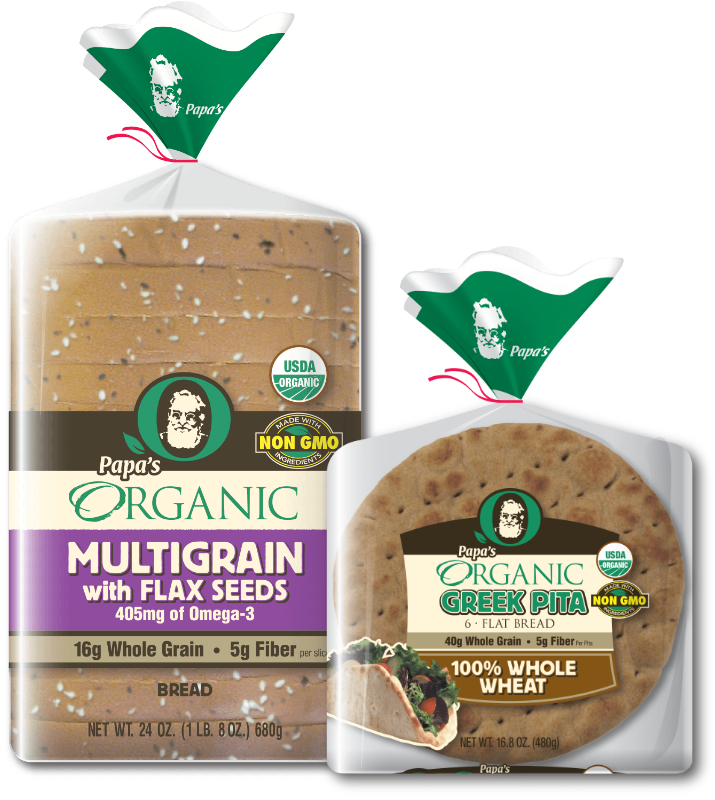 Pan-O-Gold has pursued formulation changes that provide a cleaner label, but Mr. Alton said he is doing so with a jaundiced eye.
Pan-O-Gold has pursued formulation changes that provide a cleaner label, but Mr. Alton said he is doing so with a jaundiced eye.
“I’ve seen data showing a very, very low percentage of consumers said they were regularly looking at the Nutrition Facts Label,” he said. “That kind of flew in the face of my expectations since there is such a big trend toward clean label in our industry. Is it necessary? Maybe we’re all drinking our own Kool-Aid. We’re all moving in lockstep. But it’s a real minority voice that’s driving the change.”
Mr. Alton also expressed wariness over prospects for the organic bread market.
“We recently introduced our Papa Pita line of organic products,” he said. “Organic is something every grocer demands. They’re hearing from consumers, but I fail to see them really growing in the marketplace. Even the largest brand has a pretty small share. But organic bread is getting more space, overall.”
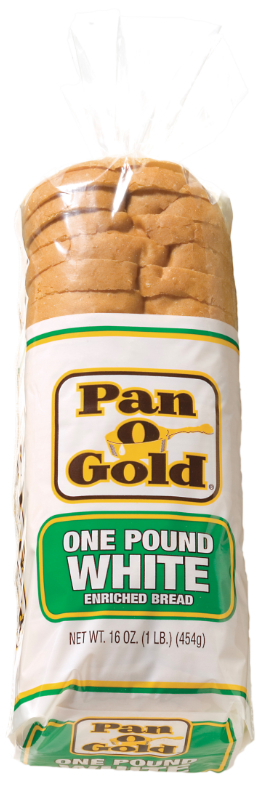 Another hurdle Pan-O-Gold has experienced in the marketplace is the increasing difficulty in placing bread along the perimeter of the store. Mr. Alton said brands that formerly had a solid position in the store perimeter increasingly appear to be on shakier footing.
Another hurdle Pan-O-Gold has experienced in the marketplace is the increasing difficulty in placing bread along the perimeter of the store. Mr. Alton said brands that formerly had a solid position in the store perimeter increasingly appear to be on shakier footing.
“That’s the most coveted real estate in the store,” he said. “Bread is being pushed even more to the center of the store, which is shrinking as retailers look for more perimeter space for ready-to-eat meals.”
The shrinkage of bread sales at supermarkets reflects the increased availability of bread and other foods in other channels.
“Quik Trip is building a new bakery,” Mr. Alton said. “It’s a convenience store, and they’re a player. There is a lot of competition. You can even buy bread in Menards.”
For bread and buns, shifts in what is being served at quick-service restaurants have not been a positive, he said.
Gluten-free bread growing
Among “free-from” categories that have generated growth in recent years, gluten-free stands out among the most powerful trends. A fast-growing player in the gluten-free baking space is Canyon Bakehouse, Johnstown, Colo.
Beginning operations in 2008, the company was established by Joshua W. Skow and his wife Christi after she was diagnosed with Celiac disease. A serial entrepreneur who already had three start-ups under his belt, Mr. Skow teamed up with Ed Miknevicius to establish a gluten-free baking company. Mr. Miknevicius came to Canyon from a 24-year career at Rudis Organic Bakery, where he was director of research and development. In 2009 Whole Foods began carrying Canyon’s bread in the Rocky Mountain Region in 2009, and growth since then has been “beyond our imagination,” said Mr. Skow, who is president and chief executive officer.
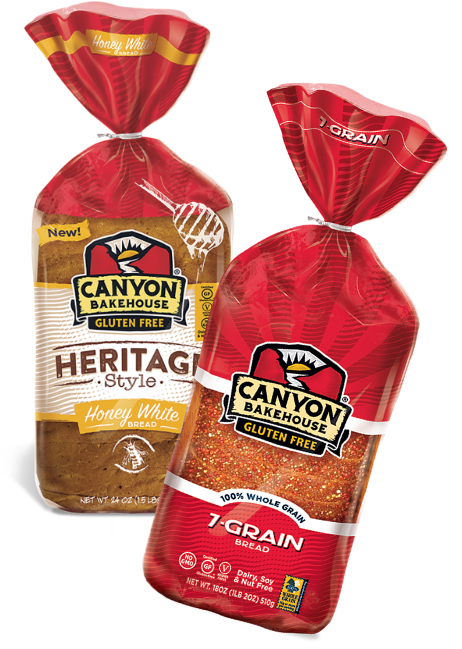 “Since then the business just has not stopped growing,” he said. There have been many years of 100% growth, and last year we grew over 30%.”
“Since then the business just has not stopped growing,” he said. There have been many years of 100% growth, and last year we grew over 30%.”
Mr. Skow said a production expansion project is nearing completion and that the company currently operates from a 200,000-square-foot baking facility in Johnstown, just north of Denver.
He attributes Canyon’s success principally to the quality of its bread but acknowledges that baking gluten-free bread that satisfies consumers is a challenge.
“It’s really hard to make bread without gluten,” he said. “Wheat is god’s gift to mankind for making bread.”
When the company was established, Canyon sought to introduce bread with texture, mouthfeel and taste that is the same as conventional bread, Mr. Skow said.
“A key differentiator when we started is that our bread was soft yet strong,” he said “You could put peanut butter on it, and it wouldn’t fall apart. Plus our bread had shelf life of several weeks. Before that, gluten-free bread was bought out of the freezer. And the quality was so poor, you had to toast it, slather it with all sorts of toppings and choke it down.”
As the company has matured, it has continued enhancing its formulations, Mr. Skow said.
“Quality has evolved as we’ve better understood ingredient functionality — how that factors with manufacturing capacity,” he said. “Our bread is better than a few years ago and continues to get better. I am a fan. That’s the litmus test since I don’t have Celiac disease. Our tagline is ‘Love bread again.’ Our consumers ate bread at one time. They know what good bread tastes like.”
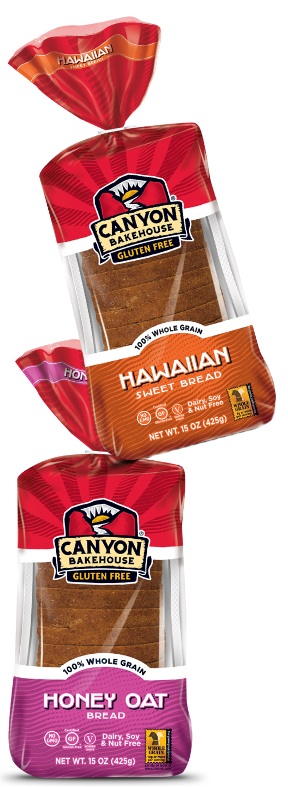 While Canyon has expanded its line to include buns, bagels and brownie bites, sliced bread remains the company’s leading product.
While Canyon has expanded its line to include buns, bagels and brownie bites, sliced bread remains the company’s leading product.
In early 2017, Canyon introduced a Heritage style line in honey white and whole grain varieties.
“A common complaint in the gluten-free world is that bread slices are smaller,” Mr. Skow said. “Heritage is a pan loaf that is similar in size to the premium organic bread on the market. It’s taller and has done really, really well.”
Later in 2017, Canyon unveiled a Stay-Fresh bread line in two varieties — ancient grain and country white. In February 2018, honey oat and Hawaiian sweet bread varieties were added.
The Stay-Fresh line are fresh, never frozen and have a 90-day shelf life. Across its line of baked foods, a base of sorghum and rice flour is used by Canyon.
“Many other bakers use modified starches,” Mr. Skow said. “One thing about Canyon Bakehouse — we were born in the natural products industry. Our first customer was Whole Foods. We have a clean label. We steer clear of modified ingredients, chemicals, etc. We use a variety of grains — wheat, rye and barley are the ones we don’t use. We use many of the ancient grains. They perform well in the mixes.”
Even as Canyon continues to grow rapidly (the company recently became the second-largest baker of gluten-free bread in the United States and is the top-selling line in the natural channel), the overall rate of growth for gluten-free products has slowed. Still, Mr. Skow sees plenty of opportunity. Canyon products currently are distributed nationally and in Canada, but he said distribution tends to be thin in the Midwest and the East.
“The growth of gluten-free has slowed, but the important thing is that it is still growing,” he said. “It grew 8% or 9% last year. That is less than in the past. It. definitely was growing double digits for a while. There has been more saturation.”
For Canyon, quality will be key to sustaining growth moving forward, Mr. Skow said.




